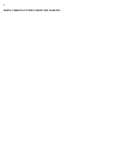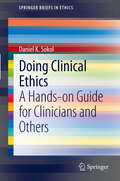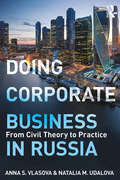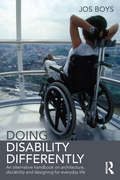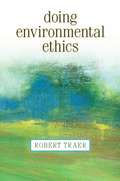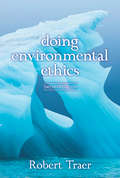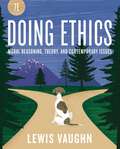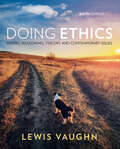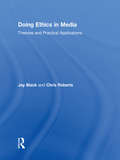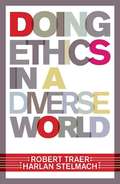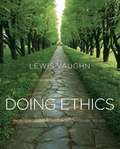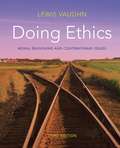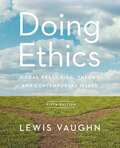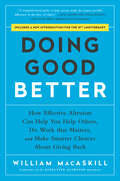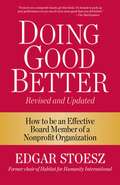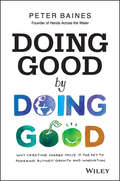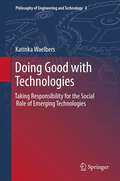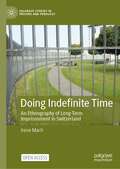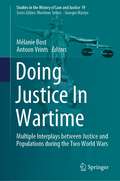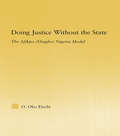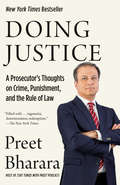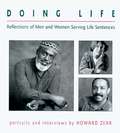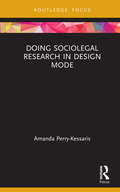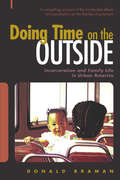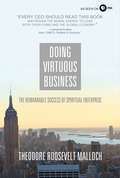- Table View
- List View
Doing Christian Ethics From The Margins
by Miguel A. De La TorreA revised and expanded edition of the text that presents a justice-based ethics that avails itself of the perspectives and experiences of those on the margins.
Doing Clinical Ethics
by Daniel K. SokolIn this Brief, Daniel Sokol interprets 'doing medical ethics' broadly to capture the application of ethical knowledge to a concrete situation, rather than just resolving a moral dilemma contained within a case. It instructs clinicians on how to identify and analyse a clinical ethics case, and guides the reader in publishing in general medical, specialist medical, and medical ethics journals, and through presenting on ethical issues at conferences. In addition to this, advice on how to teach medical ethics, and apply for research ethics approval, is included. "...an admirably short and clear guide to doing medical ethics... I welcome this book and urge medical students and doctors of all grades to read it in paper, on-line or on your portable screen reader." Sir Richard Thompson, President of the Royal College of Physicians, UK "Dr. Sokol has provided the field with a much needed, easy and comprehensive tool on 'doing' clinical ethics that all should have in their back pockets." Dr. Nneka Mokwunye, Director of Bioethics, Washington Hospital Center, Washington DC, USA "This is a magnificent guide to clinical ethics and reflects the author's very well known and widely respected academic gravitas and real life experience in clinical ethics. It is a "must read" for anyone involved in the field." Mr. Vassilios Papalois, Consultant Surgeon and Chairman, Imperial College Healthcare NHS Trust Clinical Ethics Committee, UK
Doing Corporate Business in Russia: From Civil Theory to Practice
by Anna S. Vlasova Natalia M. UdalovaThe right to do business in Russia is granted by the Constitution of the Russian Federation, which states that everyone shall have the right to freely use his or her abilities and property for entrepreneurial or any other economic activity not prohibited by the law. In the Russian Civil Code, business activity is understood as an independent activity, performed at one’s own risk, aimed at systematically deriving profit from the use of the property, the sale of commodities, the performance of work, or the rendering of services by the persons registered in this capacity in conformity with the law-established procedure. Doing Corporate Business in Russia attempts to examine not only the theoretical aspects of Russian business procedures, but also the specific nature of their implementation. This book offers an examination of the process of establishing, functioning, and terminating various types of business corporations in the Russian Federation and gives readers a thorough understanding of business in Russia. It clarifies the legal features of management and interaction with contractors and public authorities. It also touches upon the issues of legal linguistics and its role in legal practice. Knowledge in this field enables the reader to get a sense of the correct interpretation of the content of legal documents, proper definitions of terms, and of the potential violations of the rights of business entities based on improper understanding of normative language. The book will be useful to scientists and practicing lawyers, students, and anyone interested in the specifics of corporate business entities and the Russian business climate.
Doing Disability Differently: An alternative handbook on architecture, dis/ability and designing for everyday life
by Jos BoysThis ground-breaking book aims to take a new and innovative view on how disability and architecture might be connected. Rather than putting disability at the end of the design process, centred mainly on compliance, it sees disability – and ability – as creative starting points for the whole design process. It asks the intriguing question: can working from dis/ability actually generate an alternative kind of architectural avant-garde? To do this, Doing Disability Differently: explores how thinking about dis/ability opens up to critical and creative investigation our everyday social attitudes and practices about people, objects and space argues that design can help resist and transform underlying and unnoticed inequalities introduces architects to the emerging and important field of disability studies and considers what different kinds of design thinking and doing this can enable asks how designing for everyday life – in all its diversity – can be better embedded within contemporary architecture as a discipline offers examples of what doing disability differently can mean for architectural theory, education and professional practice aims to embed into architectural practice, attitudes and approaches that creatively and constructively refuse to perpetuate body 'norms' or the resulting inequalities in access to, and support from, built space. Ultimately, this book suggests that re-addressing architecture and disability involves nothing less than re-thinking how to design for the everyday occupation of space more generally.
Doing Environmental Ethics
by Robert TraerDoing Environmental Ethics offers a way to face our ecological crisis that draws on environmental science, economic theory, international law, and religious teachings, as well as philosophical arguments. It engages readers in constructing ethical presumptions based on our duty (to other persons and species and also to ecosystems), our character (personal virtues), our relationships (with other persons and nature), and our rights (to sustainable development and a healthy environment). Then it tests these moral presumptions by predicting the likely consequences of acting on them. Readers apply what they have learned to specific policy issues discussed in the final part of the book: sustainable consumption, environmental policy, clean air and water, agriculture, managing public lands, urban ecology, and climate change. Questions after each chapter and a worksheet aid readers in deciding how to live more responsibly as consumers and as citizens. "What you do matters," Robert Traer writes, "and the person you are also matters. In ethics we look for reasons to explain why this is so.
Doing Environmental Ethics (Second Edition)
by Robert TraerDoing Environmental Ethics faces our ecological crisis by drawing on environmental science, economic theory, international law, and religious teachings, as well as philosophical arguments. It engages students in constructing ethical presumptions based on arguments for duty, character, relationships, and rights, and then tests these moral presumptions by predicting the likely consequences of acting on them. Students apply what they learn to policy issues discussed in the final part of the book: sustainable consumption, environmental policy, clean air and water, agriculture, managing public lands, urban ecology, and climate change. Questions after each chapter and a worksheet aid readers in deciding how to live more responsibly. The second edition has been updated to reflect the latest developments in environmental ethics, including sustainable practices of corporations, environmental NGO actions, and rainforest certification programs. This edition also gives greater emphasis to environmental justice, Rawls, and ecofeminism. Revised study questions concern application and analysis, and new "Decisions" inserts invite students to analyze current environmental issues.
Doing Ethics (Seventh Edition): Moral Reasoning And Contemporary Moral Issues
by Lewis VaughnDiscover the #1 introductory ethics textbook Doing Ethics by Lewis Vaughn is a Swiss Army knife for courses in introductory ethics. Instructors love that it combines the benefits of a moral theory primer, a handbook on moral reasoning, and an applied ethics anthology in one inexpensive volume. Throughout the text, clear writing and remarkably effective pedagogy reinforce core concepts and invite students to think critically about the material. InQuizitive—Norton’s easy-to-use learning tool—sharpens students’ understanding of moral reasoning fundamentals and prepares them to engage with real-world issues. New InQuizitive questions focus on the Seventh Edition’s updated coverage of the moral issues facing today’s students.
Doing Ethics (Sixth Edition): Moral Reasoning, Theory, And Contemporary Issues
by Lewis VaughnTeaching students how to actively apply moral reasoning Doing Ethics is the best-selling book for courses with an applied emphasis. It teaches moral decision making as an active process, giving students the theoretical and logical tools required to do ethics. The Sixth Edition offers expanded coverage of relevant issues, including race and racism, health care, and tolerance and civility online and in public spaces. New activities in InQuizitive—Norton's award-winning adaptive learning tool—have been expanded to include material on contemporary topics, enabling students to apply moral reasoning to the issues they care about, both in the course and beyond.
Doing Ethics in Media: Theories and Practical Applications
by Chris Roberts Jay BlackDoing Ethics in Media: Theories and Practical Applications is an accessible, comprehensive introduction to media ethics. Its theoretical framework and grounded discussions engage students to think clearly and systematically about dilemmas in the rapidly changing media environment. The 13-chapter text is organized around six decision-making questions-- the "5Ws and H" of media ethics. The questions encourage students to articulate the issues; apply codes, policies or laws; consider the needs of stakeholders; sift and sort through conflicting values; integrate philosophic principles; and pose a "test of publicity." Specifically, the questions ask: * What's your problem? * Why not follow the rules? * Who wins, who loses? * What's it worth? * Who's whispering in your ear? * How's your decision going to look? As they progress through the text, students are encouraged to resolve dozens of practical applications and increasingly complex case studies relating to journalism, new media, advertising, public relations, and entertainment. Other distinctive features include: * Comprehensive materials on classic moral theory and current issues such as truth telling and deception, values, persuasion and propaganda, privacy, diversity, and loyalty. * A user-friendly approach that challenges students to think for themselves rather than imposing answers on them. * Consistent connections between theories and the decision-making challenges posed in the practical applications and case studies. * A companion website with online resources for students, including additional readings and chapter overviews, as well as instructor materials with a test bank, instructor's manual, sample syllabi and more. www.routledge.com/textbooks/black * A second website with continuously updated examples, case studies, and student writing - www.doingmediaethics.com. Doing Ethics in Media is aimed at undergraduates and graduate students studying media ethics in mass media, journalism, and media studies. It also serves students in rhetoric, popular culture, communication studies, and interdisciplinary social sciences.
Doing Ethics in a Diverse World
by Robert Traer Harlan StelmachNothing is more difficult today than deciding what to do about abortion, gay marriage, economic injustice, war, torture, global warming, euthanasia, capital punishment, and a host of other controversies, particularly in a world in which people of varying religious, cultural, and ethnic backgrounds commonly live side by side. Can we draw on the wisdom of the past to address these contemporary ethical dilemmas? Can we see more clearly how we should consider what is right and wrong, and good and bad, and then work through these divisive problems toward decisions that make sense to us?While challenging moral relativism, Doing Ethics in a Diverse World uses a pluralist approach that draws on religious as well as secular positions and on Eastern as well as Western traditions. The book's approach reasons by analogy from the rule of law, including international human rights law, as a means to constructing ethical presumptions about duty, character, relationships, and rights. These presumptions are weighed against the predicted consequences of acting on them, which either confirm the presumptions or support alternative actions. Employing a "Worksheet for Doing Ethics" as a guiding framework, this approach is then applied to issues of public morality, health care, economic justice, sex, the war on terrorism, and living ecologically.
Doing Ethics: Moral Reasoning and Contemporary Issues (2nd edition)
by Lewis VaughnDoing Ethics is really three books in one: a clear and comprehensible introduction to ethical theory, a practical guide for applying critical thinking skills to contemporary moral issues, and an anthology of readings in applied ethics. The Second Edition includes 38 new readings and 2 new topics adding value for students in terms of usage.
Doing Ethics: Moral Reasoning and Contemporary Issues (Third Edition)
by Lewis VaughnThis book helps students see why ethics matters to society and to themselves, understand core concepts ,be familiar with the background of contemporary moral problems; and know how to apply critical reasoning to those problems.
Doing Ethics: Moral Reasoning, and Contemporary Issues
by Lewis VaughnThis is the best-selling book for courses with an applied emphasis. It teaches moral decision making as an active process, giving students the theoretical and logical tools required to do ethics. The Fifth Edition offers expanded coverage of topics that students find relevant, including free speech on campus, hook-up culture, sexual consent, racism, and discrimination. A NEW InQuizitive adaptive learning tool features game-like activities that build mastery of core concepts and theories.
Doing Good Better: How Effective Altruism Can Help You Help Others, Do Work that Matters, and Make Smarter Choices about Giving Back
by William MacAskillMost of us want to make a difference. We donate our time and money to charities and causes we deem worthy, choose careers we consider meaningful, and patronize businesses and buy products we believe make the world a better place. Unfortunately, we often base these decisions on assumptions and emotions rather than facts. As a result, even our best intentions often lead to ineffective—and sometimes downright harmful—outcomes. How can we do better? While a researcher at Oxford, trying to figure out which career would allow him to have the greatest impact, William MacAskill confronted this problem head on. He discovered that much of the potential for change was being squandered by lack of information, bad data, and our own prejudice. As an antidote, he and his colleagues developed effective altruism, a practical, data-driven approach that allows each of us to make a tremendous difference regardless of our resources. Effective altruists believe that it&’s not enough to simply do good; we must do good better. At the core of this philosophy are five key questions that help guide our altruistic decisions: How many people benefit, and by how much? Is this the most effective thing I can do? Is this area neglected? What would have happened otherwise? What are the chances of success, and how good would success be? By applying these questions to real-life scenarios, MacAskill shows how many of our assumptions about doing good are misguided. For instance, he argues one can potentially save more lives by becoming a plastic surgeon rather than a heart surgeon; measuring overhead costs is an inaccurate gauge of a charity&’s effectiveness; and, it generally doesn&’t make sense for individuals to donate to disaster relief. MacAskill urges us to think differently, set aside biases, and use evidence and careful reasoning rather than act on impulse. When we do this—when we apply the head and the heart to each of our altruistic endeavors—we find that each of us has the power to do an astonishing amount of good.
Doing Good Better: How to be an Effective Board Member of a Nonprofit Organization
by Edgar StoeszThis trusted handbook for nonprofit board service is newly revised and includes new case studies and even more tips and ideas from the trenches of nonprofit board work. Doing Good Better is approachable wisdom. Edgar Stoesz has made Doing Good Better a guidebook for both board members of nonprofits, whether new to the task, or highly experienced. First, Stoesz identifies two failings common to many boards of nonprofit organizations that are often overlooked: 1. A board’s governance role is very different from the role of management. "Making this distinction requires a reorientation for most board member, because in their day jobs, they are managers or employees. ” 2. Boards often fail at two matters: a. ) preparation of their members, and b. ) regular evaluations of their own effectiveness and focus. In short, pointedly-written chapters, Stoesz covers: Helping Directors Understand Their Governance Role A Plan to Fulfill the Purpose Reporting Back to the Members Planning Effective Meetings Great Boards Have a Good Fight (occasionally) Working Your Way Through a Crisis Great Boards Celebrate Leaving Right Stoesz deftly interweaves background philosophy, vision, and razor-sharp specific ideas. "Discussion/Action Questions” conclude many of the chapters. In addition, Stoesz offers a "Board Evaluation Form,” a "Director’s Self-Evaluation Form,” and an outline for the "Executive Director Annual Review. ”
Doing Good By Doing Good
by Peter BainesBring the heart of your company into the community with effective CSRDoing Good by Doing Good shows companies how to improve the bottom line by implementing an engaging, authentic, and business-enhancing program that helps staff and business thrive. International CSR consultant Peter Baines draws upon lessons learnt from the challenges faced in his career as a police officer, forensic investigator, and founder of Hands Across the Water to describe the Australian CSR landscape, and the factors that make up a program that benefits everyone involved. Case studies illustrate the real effect of CSR on both business and society, with clear guidance toward maximizing involvement, engaging all employees, and improving the bottom line. The case studies draw out the companies that are focusing on creating shared value in meeting the challenges of society whilst at the same time bringing strong economic returns.Consumers are now expecting that big businesses with ever-increasing profits give back to the community from which those profits arise. At the same time, shareholders are demanding their share and are happy to see dividends soar. Getting this right is a balancing act, and Doing Good by Doing Good helps companies delineate a plan of action for getting it done. Readers will:Define an effective CSR strategy that promotes better business and makes a real impactUnderstand the current landscape to evaluate the CSR options that are right for your companyUnderstand why corporate philanthropy is no longer enoughIdentify the hard and soft key performance indicators that help keep your program on trackGain an understanding of the concept of shared value and the importance to businessGain insight into each step of the CSR process, from interest, to information, to implementationThe concept of CSR is not new, but traditional "payroll deductions" and "volunteer days" are out-dated and grossly ineffective. Today, companies are building simple, well-constructed programs that are changing business and changing lives on a much grander scale. Doing Good by Doing Good provides a fool proof strategy for CSR planning, with value to the company, employees, and community at large.
Doing Good with Technologies:
by Katinka Waelbers20th century technologies like cars, the Internet, and the contraceptive pill have altered our actions, changed our perceptions and influenced our moral ideas, for better and worse. Upcoming technologies are bound to fulfill their own unique social roles. How can we advance this social role so that it will support the good live and limit undesired changes? This book explores whether we can take a forward looking responsibility to optimize the social roles of technologies. In doing so, the book discusses three issues: first, it aims to understand the social role of technologies; second, it explores what it means to accept responsibility for this social role, and; third, it searches for some forward looking tools that help us to see how new technologies may influence human behavior. In a rather unique approach, this book combines the influential sociological research of Bruno Latour on the social impacts of technologies with the contemporary Aristotelianism of Alasdair MacIntyre.
Doing Indefinite Time: An Ethnography of Long-Term Imprisonment in Switzerland (Palgrave Studies in Prisons and Penology)
by Irene MartiThis open access book provides insights into the everyday lives of long-term prisoners in Switzerland who are labelled as ‘dangerous’ and are preventatively held in indefinite, probably lifelong, incarceration. It explores prisoners’ manifold ways of inhabiting the prison which can be used to challenge well established notions about the experience of imprisonment, such as ‘adaptation’, ‘coping’, and ‘resistance’. Drawing on ethnographic data generated in two high-security prisons housing male offenders, this book explores how the various spaces of the prison affect prisoners’ sense of self and experience of time, and how, in particular, the indeterminate nature of their imprisonment affects their perceptions of place and space.It sheds light on prisoners’ subjective, emplaced and embodied perceptions of the prisons' various everyday time-spaces in the cell, at work, and during leisure time, and the forms of agency they express. It provides insight into prisoners’ everyday habits, practices, routines, and rhythms as well as the profoundly existential issues that are engendered, (re)arranged, and anchored in these everyday contexts. It also offers insights into the penal policies, norms, and practices developed and followed by prison authorities and staff.
Doing Justice In Wartime: Multiple Interplays between Justice and Populations during the Two World Wars (Studies in the History of Law and Justice #19)
by Mélanie Bost Antoon VrintsThis book discusses the impact of war on the complex interactions between various actors involved in justice: individuals and social groups on the one hand and ‘the justice system’ (police, judiciary and professionals working in the prison service) on the other. It also highlights the emergence of new expectations of justice among these actors as a result of war. Furthermore, the book addresses justice practices, strategies for coping with the changing circumstances, new forms of negotiation, interactions, relationships between populations and the formal justice system in this specific context, and the long-term effects of this renegotiation.Ten out of the eleven chapters focus on Belgian issues, covering the two world wars in equal measure. Belgium’s diverse war experiences in the twentieth century mean that a study of the country provides fascinating insights into the impact of war on the dynamics of ‘doing justice’. The Belgian army fought in both world wars, and the vast majority of the population experienced military occupation. The latter led to various forms of collaboration with the enemy, which required the newly reinstalled Belgian government to implement large-scale judicial processes to repress these ‘antipatriotic’ behaviours, in order to restore both its authority and legitimacy and to re-establish social peace.
Doing Justice without the State: The Afikpo (Ehugbo) Nigeria Model (African Studies)
by Ogbonnaya Oko ElechiThis study examines the principles and practices of the Afikpo (Eugbo) Nigeria indigenous justice system in contemporary times. Like most African societies, the Afikpo indigenous justice system employs restorative, transformative and communitarian principles in conflict resolution. This book describes the processes of community empowerment, participatory justice system and how regular institutions of society that provide education, social and economic support are also effective in early intervention in disputes and prevention of conflicts.
Doing Justice: A Prosecutor's Thoughts on Crime, Punishment, and the Rule of Law
by Preet BhararaBy the one-time federal prosecutor for the Southern District of New York, an important overview of the way our justice system works, and why the rule of law is essential to our society. Using case histories, personal experiences and his own inviting writing and teaching style, Preet Bharara shows the thought process we need to best achieve truth and justice in our daily lives and within our society. <P><P>Preet Bharara has spent much of his life examining our legal system, pushing to make it better, and prosecuting those looking to subvert it. Bharara believes in our system and knows it must be protected, but to do so, we must also acknowledge and allow for flaws in the system and in human nature. The book is divided into four sections: Inquiry, Accusation, Judgment and Punishment. He shows why each step of this process is crucial to the legal system, but he also shows how we all need to think about each stage of the process to achieve truth and justice in our daily lives. <P><P>Bharara uses anecdotes and case histories from his legal career--the successes as well as the failures--to illustrate the realities of the legal system, and the consequences of taking action (and in some cases, not taking action, which can be just as essential when trying to achieve a just result). Much of what Bharara discusses is inspiring--it gives us hope that rational and objective fact-based thinking, combined with compassion, can truly lead us on a path toward truth and justice. <P><P>Some of what he writes about will be controversial and cause much discussion. Ultimately, it is a thought-provoking, entertaining book about the need to find the humanity in our legal system--and in our society. <P><b>A New York Times Bestseller</b>
Doing Life: Reflections Of Men And Women Serving Life Sentences
by Howard Zehr<P> What does it mean to face a life prison sentence? What have "lifers" learned about life-from having taken a life? Photographer Howard Zehr has interviewed and made portraits of men and women in Pennsylvania prisons who are serving life sentences without possibility of parole. Readers see the prisoners as people, de-mystified. <P><P> Brief text accompanies each portrait, the voice of each prisoner speaking openly about the crime each has committed, the utter violation of another person each has caused. They speak of loneliness, missing their children growing up, dealing with the vacuum, caught between death and life. A timely book.
Doing Sociolegal Research in Design Mode
by Amanda Perry-KessarisThis book is the first to explore what design can do for sociolegal research. It argues that designerly ways—mindsets that are practical, critical and imaginative, experimental processes and visible and tangible communication strategies—can be combined to generate potentially enabling ecosystems; and that within these ecosystems the abilities of a researcher to make meaningful contributions and to engage in meaningful research relations, both within our research community and in the wider world, can be enhanced. It is grounded in richly illustrated examples of sociolegal researchers working in design mode, including original individual and collaborative experiments involving a total of over 200 researchers; and of experts from subfields such as social design, policy design, and speculative design working on issues of sociolegal concern. It closes with an opening: a set of accessible sociolegal design briefs on which the impatient can make an immediate start. Written by an experienced sociolegal researcher with formal training in graphic design, the book is primarily focused on what the sociolegal research community can take from design, but it also offers lessons to designers, especially those who work with law.
Doing Time on the Outside: Incarceration and Family Life in Urban America
by Donald Braman"Stigma, shame and hardship---this is the lot shared by families whose young men have been swept into prison. Braman reveals the devastating toll mass incarceration takes on the parents, partners, and children left behind. " -Katherine S. Newman "Doing Time on the Outsidebrings to life in a compelling way the human drama, and tragedy, of our incarceration policies. Donald Braman documents the profound economic and social consequences of the American policy of massive imprisonment of young African American males. He shows us the link between the broad-scale policy changes of recent decades and the isolation and stigma that these bring to family members who have a loved one in prison. If we want to understand fully the impact of current criminal justice policies, this book should be required reading. " -Mark Mauer, Assistant Director, The Sentencing Project "Through compelling stories and thoughtful analysis, this book describes how our nation's punishment policies have caused incalculable damage to the fabric of family and community life. Anyone concerned about the future of urban America should read this book. " -Jeremy Travis, The Urban Institute In the tradition of Elijah Anderson'sCode of the Streetand Katherine Newman'sNo Shame in My Game, this startling new ethnography by Donald Braman uncovers the other side of the incarceration saga: the little-told story of the effects of imprisonment on the prisoners' families. Since 1970 the incarceration rate in the United States has more than tripled, and in many cities-urban centers such as Washington, D. C. -it has increased over five-fold. Today, one out of every ten adult black men in the District is in prison and three out of every four can expect to spend some time behind bars. But the numbers don't reveal what it's like for the children, wives, and parents of prisoners, or the subtle and not-so-subtle effects mass incarceration is having on life in the inner city. Author Donald Braman shows that those doing time on the inside are having a ripple effect on the outside-reaching deep into the family and community life of urban America. Braman gives us the personal stories of what happens to the families and communities that prisoners are taken from and return to. Carefully documenting the effects of incarceration on the material and emotional lives of families, this groundbreaking ethnography reveals how criminal justice policies are furthering rather than abating the problem of social disorder. Braman also delivers a number of genuinely new arguments. Among these is the compelling assertion that incarceration is holding offenders unaccountable to victims, communities, and families. The author gives the first detailed account of incarceration's corrosive effect on social capital in the inner city and describes in poignant detail how the stigma of prison pits family and community members against one another. Drawing on a series of powerful family portraits supported by extensive empirical data, Braman shines a light on the darker side of a system that is failing the very families and communities it seeks to protect.
Doing Virtuous Business
by Theodore Roosevelt MallochCan the concept of "Spiritual Capital" actually ensure a company's success?Critics of capitalism view big businesses as insatiable masters of the universe with little regard for the public. They label those who create wealth as greedy, malicious, and unscrupulous. Doing Virtuous Business answers these charges head-on. In this insightful and original book, Theodore Roosevelt Malloch presents the bold idea that the creation of wealth by virtuous means is the most important thing that can be done for society.Doing Virtuous Business explains the true purpose of business and illuminates the connection between a free economy and religious liberty. Drawing from the notion of "social capital," which has been developed by generations of scholars, Malloch adds the concept of "spiritual capital" as a foundation for social progress and also a necessity for responsible and successful enterprise. He details the virtues that sustain a business and a free market--virtues that build up a network of trust, which is critical to the global economy.Malloch reveals that a company's soul determines its "spiritual capital," an equally imperative foundation to success. From Wal-Mart to IBM, Malloch demonstrates how companies that operate on ethical models informed by spiritual traditions have outperformed their competitors. This book is a welcome moral defense of free enterprise and a sensible guide for achieving the ideal of virtuous business. Besides making the world a better place, Malloch argues, virtuous enterprise makes companies far more successful and profitable than they otherwise would be. He presents case studies of virtuous business in the Judeo-Christian tradition as well as statistical analysis demonstrating how companies that operate on ethical models have outperformed their competitors over the long run.
